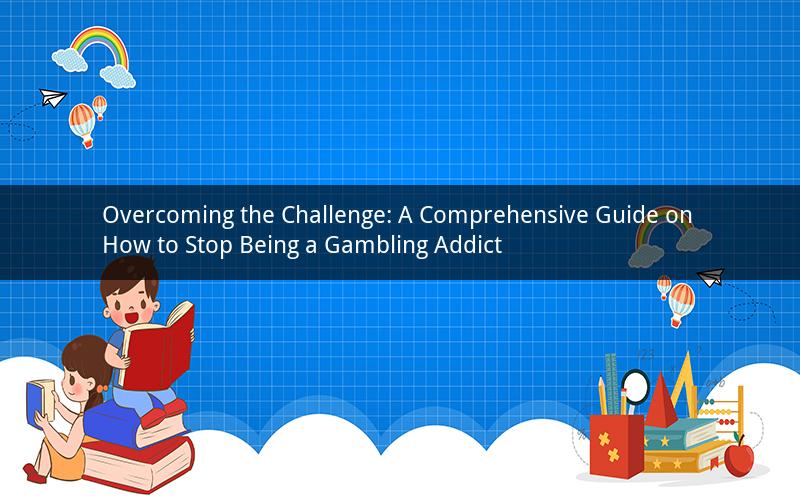
Introduction:
Gambling addiction is a complex issue that affects individuals from all walks of life. It is characterized by an inability to control the urge to gamble, leading to severe financial, emotional, and social consequences. This guide aims to provide valuable insights and practical strategies on how to overcome the challenge of gambling addiction.
1. Understanding the Nature of Gambling Addiction
To address the problem, it is crucial to first understand the nature of gambling addiction. Unlike other addictions, gambling addiction is not solely driven by physical cravings. Instead, it is a psychological condition that stems from a variety of factors, including the thrill of taking risks, the desire for excitement, and the need for escape.
2. Recognizing the Signs of Gambling Addiction
Identifying the signs of gambling addiction is the first step towards overcoming it. Common signs include a preoccupation with gambling, lying about gambling activities, borrowing money to finance gambling, feeling restless or irritable when not gambling, and neglecting responsibilities.
3. Seeking Professional Help
Gambling addiction is a serious condition that requires professional intervention. Therapists specializing in addiction treatment can provide personalized support and guidance. They can help individuals understand the root causes of their addiction and develop effective coping strategies.
4. Building a Support System
Creating a strong support system is essential for overcoming gambling addiction. This can include friends, family members, or support groups. Surrounding yourself with individuals who understand and support your journey towards recovery can significantly enhance your chances of success.
5. Identifying Triggers and Avoiding Them
Identifying triggers that trigger your urge to gamble is crucial. These triggers may include certain social settings, specific emotions, or even certain locations. Once identified, it is important to avoid these triggers or develop strategies to cope with them effectively.
6. Developing Coping Mechanisms
Developing healthy coping mechanisms is essential to deal with cravings and stress. Engaging in activities that provide relaxation and fulfillment, such as exercise, meditation, or hobbies, can help distract you from the urge to gamble. Additionally, seeking emotional support from friends, family, or professionals can provide a sense of comfort and guidance.
7. Creating a Budget and Financial Management Plan
Gambling addiction often leads to significant financial problems. Creating a budget and a financial management plan is crucial to regain control over your finances. Consider seeking assistance from a financial advisor or counselor to help you establish a realistic budget and develop strategies to manage your finances effectively.
8. Establishing Healthy Boundaries
Setting healthy boundaries is essential to prevent relapse. This includes limiting access to gambling websites or establishments, setting specific time limits for gambling activities, and seeking support from individuals who hold you accountable to these boundaries.
9. Building Self-Esteem and Self-Confidence
Low self-esteem and self-confidence often contribute to gambling addiction. Engaging in activities that boost self-esteem and self-confidence, such as pursuing education, learning new skills, or participating in community service, can help rebuild your self-worth and reduce the urge to gamble.
10. Maintaining Long-Term Sobriety
Overcoming gambling addiction is a lifelong journey. It is important to maintain long-term sobriety by continuing to seek support, practicing healthy coping mechanisms, and remaining vigilant against triggers. Celebrate milestones and setbacks as opportunities for growth and learning.
Questions and Answers:
1. How can I identify if I have a gambling addiction?
- Look for signs such as preoccupation with gambling, lying about gambling activities, borrowing money to finance gambling, feeling restless or irritable when not gambling, and neglecting responsibilities.
2. Can therapy alone help overcome gambling addiction?
- While therapy can be a valuable tool, it is often most effective when combined with other strategies such as support groups, financial management plans, and lifestyle changes.
3. What are some effective coping mechanisms for dealing with gambling cravings?
- Engaging in activities that provide relaxation and fulfillment, seeking emotional support from friends or professionals, and practicing mindfulness or meditation can be effective coping mechanisms.
4. How can I rebuild my self-esteem and self-confidence after overcoming gambling addiction?
- Engaging in activities that boost self-esteem and self-confidence, such as pursuing education, learning new skills, or participating in community service, can help rebuild your self-worth.
5. What resources are available for individuals struggling with gambling addiction?
- There are various resources available, including therapy services, support groups, financial counseling, and self-help materials. It is important to research and seek out these resources to find the ones that best suit your needs.